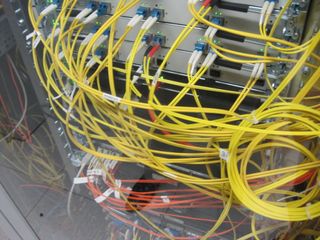Years of deliberate broadband confusion are costing UK
It shouldn't have come to this

With all the talk of 300Mbps broadband and increased national average speeds, it would have been very easy to miss one of the most important points made in Ofcom's latest research into the UK's internet connections – that millions are settling for crappy connections for no good reason.
It's obviously a good thing that the average speed of broadband connections has increased, up from 6.8 to 7.6mbps in a year, but given that those willing to pay for the privilege (and in the right area) can now get 100Mbps it was inevitable that this would tug up the average.
For me, the fact that Ofcom felt the need to highlight its concerns that people were settling for much worse connections when they could upgrade for little or no extra money, was much more important.
"More than 4 in 10 broadband consumers remain on packages with speeds of 10Mbps or less even though many of them would be able to get a higher speed at little or no extra cost if they switched package or provider," said Ofcom's report.
Why choose below average?
So the question here is why? Why are people forking out for broadband and getting less than 10Mbps?
First up there's a huge and very disgruntled group that are geographically disadvantaged; with many rural areas still incapable of achieving anything like 10Mbps.
But Ofcom says that 'many' would be able to get more bang for their buck, which brings us back to our original question.
Get daily insight, inspiration and deals in your inbox
Get the hottest deals available in your inbox plus news, reviews, opinion, analysis and more from the TechRadar team.
Presumably another big group can be excluded because they get bundled services – meaning that their broadband is part of a package of services for things like television.
Within that group you have those that just take broadband because it is there and don't really need fast connections at all and those that don't want the inconvenience of finding another provider – even if the service is better.
And then you have another group – quite possibly the largest within Ofcom's 'many' – those that simply do not upgrade for no good reason.
Confusion reigns
And that's where you hit a major issue; a huge swathe of those people won't even know that their poor internet connection is costing them the same as a better one.
A huge swathe of people that have been left confused and bewildered by the frankly ludicrous misdirection and half-truths in the way companies advertise their broadband speeds.
A huge swathe of people who feel that switching their broadband over is likely to be a confusing, difficult and lengthy process involving call centres, canned music and often obtuse service.
A huge swathe of people that should have been helped much more, and much earlier, by the watchdogs that have allowed the ISPs to ride roughshod over what is clearly right and what can be argued in a court of law.
Fair price, fair product
For most of the people who read TechRadar things like what a megabit and megabyte are, the differences between fibre to the cabinet and fibre to the home and what the star next to "unlimited" data really signifies allow us to make good decisions on our broadband.
But for millions of others they just want to pay a fair price for a fair product and not have to worry about the terminology, and that only works when there are safeguards in place.
They want to be told the truth without hyperbole or companies hiding behind semantics, they don't want to be told they could get up to a speed, they want to know speed that will be. They think that companies should be fair to them, not sticking small print in fair usage policies.
And now, ridiculously belatedly, there are: advertising must be clearer and more accurate, data must be more rigorous and companies will have to give more actual, you know, factual information to people who want to sign up.
But for many the damage has been done; broadband didn't need to be confusing or difficult but companies have made it so and many of the ISPs seem to be genuinely miffed that they are finally being brought to task.
So perhaps the real question is not why people are not getting fair broadband for a fair price, but how they were allowed to reach this state of affairs in the first place.
Patrick Goss is the ex-Editor in Chief of TechRadar. Patrick was a passionate and experienced journalist, and he has been lucky enough to work on some of the finest online properties on the planet, building audiences everywhere and establishing himself at the forefront of digital content. After a long stint as the boss at TechRadar, Patrick has now moved on to a role with Apple, where he is the Managing Editor for the App Store in the UK.

